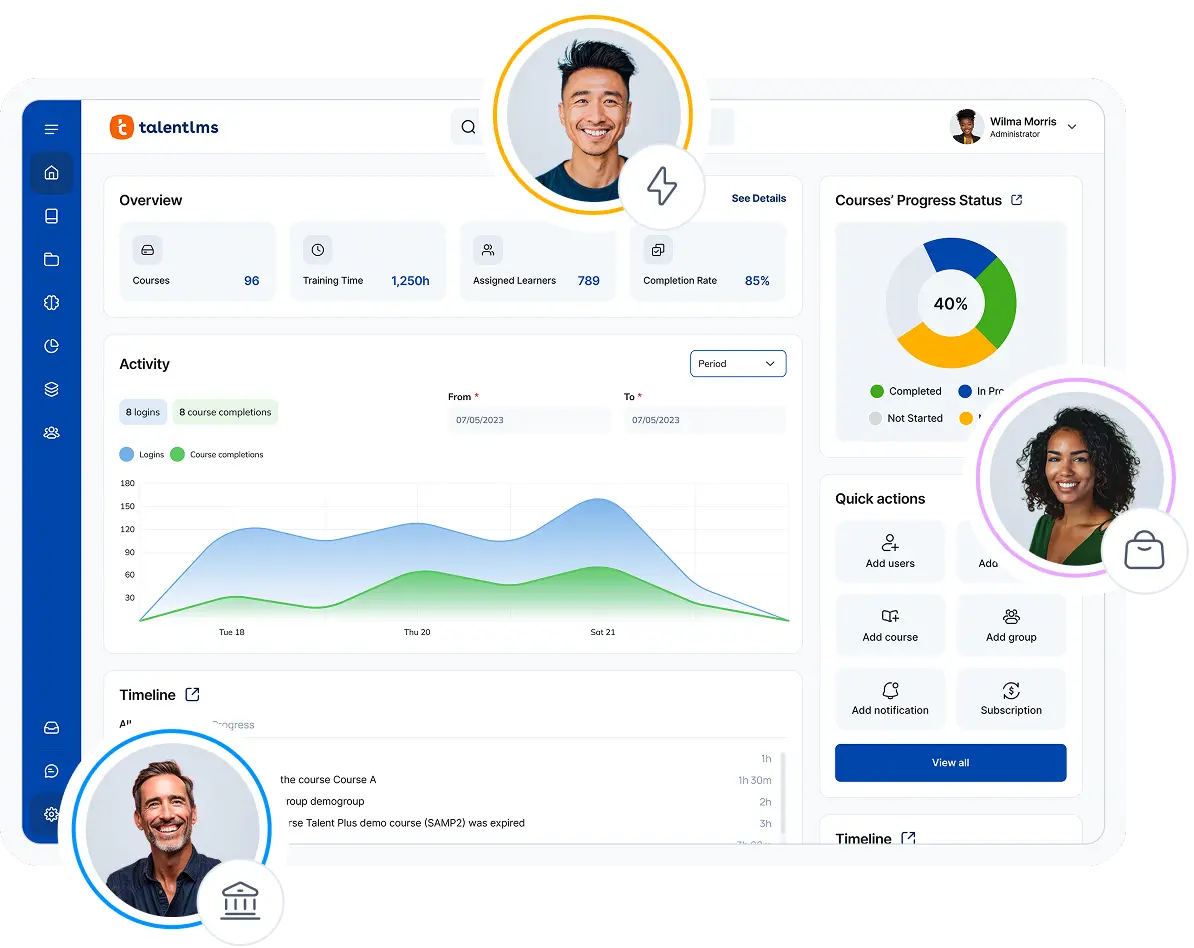- What are employee evaluations?
- How employee evaluation comments can make or break employee performance reviews
- Employee evaluation comments examples your teams will find valuable
- Example phrases for employees when responding to feedback
- How to manage employee evaluation comments: Tools and template
- How to deliver and use employee evaluation comments effectively
- Not just words: Crafting growth-focused employee evaluation comments
Employee evaluations are more than routine assessments. They’re opportunities to boost morale, ignite motivation, and foster growth. But to achieve all that, employee evaluation comments need to be perfectly pitched.
But what does “perfectly pitched” look like? In this article, we share 100+ employee evaluation comments that bridge the gap between vague feedback and actionable advice. The result? Performance reviews become engines of progress instead of tick-box exercises.
Whether you’re a manager looking for impactful feedback tools or an HR expert with a mission to revamp the evaluation experience, it also helps to have a flexible framework to work from. So, we’ve collated these employee evaluation comments into a template you can adapt to create consistent, customized, and constructive feedback.
What are employee evaluations?
For most companies, employee evaluations form part of employee performance reviews and the continuous performance management process. They serve a range of purposes:
- For the employee they provide direction for their role, support professional growth and development, and boost engagement and motivation.
- For the employer they sync individual goals with strategic targets, offer a way to measure success and progression, and help raise levels of productivity and quality of output.
Despite all of that, only 41% of employees say their company supports a culture of constructive feedback.
How employee evaluation comments can make or break employee performance reviews
According to Gallup, employees who receive meaningful feedback are almost four times more likely to be engaged. The key word here is “meaningful”. To achieve engagement (and all of the other benefits we’ve just outlined), employee evaluations need to be targeted and actionable. Which is where employee evaluation comments and phrases come in. To fuel meaningful and productive conversations, vague or general statements won’t work. The language used to articulate observations and recommendations needs to be specific, clear, and actionable. And delivered with a dash of “human touch.”
Constructive feedback vs unhelpful feedback
Let’s look at how actionable, precise feedback differs from vague performance review phrases.
Vague comment: “You need to do better with communication.”
Actionable feedback: “To boost your communication skills, become more concise in your emails and provide specific examples to explain complex ideas. Also, you could work more on active listening and empathy to understand other people’s perspectives.”
There’a clear difference between the two employee evaluation comments examples above. But managers and leaders sometimes find it challenging to offer actionable feedback. In fact, according to 45% of managers, embracing feedback is the skill leaders most need to improve. This discrepancy doesn’t happen because they don’t care. Usually it’s due to time constraints, improper training or inadequate resources.
Another big challenge is that employee evaluation comments aren’t just reserved for line managers. In many companies, employees receive feedback from peers, senior managers, and training managers too. Sometimes, they even need to rate their own performance in order to truly understand where their potential lies.

Employee evaluation comments examples your teams will find valuable
To help anyone tasked with delivering employee evaluations, we’ve created a list of helpful employee performance evaluation comments phrased in plain language. We’ve grouped these according to skills/competencies and ordered them alphabetically. Within each group are positive performance review phrases and constructive criticism phrases targeted toward required improvements. These groups and comments can also be customized for your own structured feedback conversations using our employee evaluation comments template. Keep the skills/competencies that matter most to your performance review process, company values, and organizational goals. And edit the phrases to reflect relevance to the individual/team being evaluated.
Accountability
Positive phrases
1. “You take ownership of your responsibilities and proactively address challenges.”
2. “You openly acknowledge mistakes and take immediate steps to rectify them.”
3. “You consistently communicate your progress on tasks.”
4. “You proactively suggest improvements to processes, showing accountability for not just your tasks but also team success.”
Improvement phrases
5. “You struggle to take responsibility for errors, which limits opportunities for learning and growth.”
6. “You often need reminders to complete your tasks, indicating a need for greater ownership.”
7. “You avoid taking accountability for your role in team challenges, which hinders effective problem-solving.”
8. “You provide limited updates on your progress, making it difficult for others to plan around your tasks.”
9. “You often deliver incomplete or subpar work, requiring others to step in to meet expectations.”
AI and digital skills
Positive phrases
10. “You demonstrate a strong understanding of AI tools and digital technologies, applying them to streamline workflows, optimize processes, and deliver high-quality results.”
11. “You proactively explore new AI tools, technologies and digital.”
12. “You consistently apply your technical skills to solve problems efficiently and support team goals.”
13. “You use advanced AI applications to solve complex problems and deliver data-driven solutions.”
14. “You have effectively implemented AI-driven solutions that have led to measurable improvements in productivity and accuracy.”
Improvement phrases
15. “You need to invest more time in understanding the capabilities of AI tools relevant to your role to increase efficiency.”
16. “You should focus on integrating digital tools more effectively to streamline your workflow and reduce manual processes.”
17. “You need to improve your knowledge of, and confidence in, AI-based tools by seeking additional resources and/or support.”
18. “You sometimes struggle to keep pace with new digital trends, which can impact your ability to apply the most effective tools.”
Aptitude
Positive phrases
19. “You quickly grasp new concepts and apply them effectively.”
20. “You use critical thinking skills to analyze complex problems and identify practical solutions.”
21. “You have a sharp eye for detail, which helps you produce accurate and high-quality work consistently.”
Improvement phrases
22. “You find it challenging to apply theoretical knowledge to practical tasks.”
23. “You require frequent repetition of instructions to grasp new processes.”
24. “You struggle to analyze complex problems, which impacts your ability to make informed decisions.”
Attendance
Positive phrases
25. “You consistently arrive on time and are fully prepared to start your workday.”
26. “You plan ahead for any time off, allowing for proper adjustments and minimal disruption to team operations and workflows.”
27. “You are aware of, and adhere to, the attendance policy.”
28. “You are punctual for meetings and deadlines.”
Improvement phrases
29. “You frequently arrive late, which disrupts team operations and impacts overall productivity.”
30. “You have a pattern of unplanned absences that puts additional pressure on your colleagues.”
31. “You occasionally miss scheduled meetings without prior notice.”
32. “You are unfamiliar with the attendance policy, which causes regular breaches.”
33. “You often finish work early, which impacts the team’s ability to rely on your presence.”
Attitude
Positive phrases
34. “You consistently maintain an enthusiastic and positive attitude.”
35. “You approach challenges with optimism and demonstrate a solutions-oriented mindset.”
36. “You handle stressful situations calmly and professionally.”
37. “You are keen to help others.”
38. “You respect and value colleagues and clients, creating a welcoming and inclusive environment.”
Improvement phrases
39. “You occasionally let negative emotions affect your interactions with colleagues.”
40. “You occasionally display frustration or impatience in stressful situations.”
41. “You sometimes display a negative attitude, which can come across as being disengaged.”
42. “You sometimes struggle with being receptive to others’ ideas, which can affect the open exchange of creative solutions.”
Communication and interpersonal skills
Positive phrases
43. “You deliver instructions and expectations with clarity and purpose.”
44. “You demonstrate active listening skills in meetings with colleagues.”
45. “You never interrupt colleagues when they offer opinions or suggestions.”
46. “You express your opinions carefully, and objectively.”
47. “You make arguments in a constructive and convincing way.”
48. “You use respectful, inclusive language.”
Improvement phrases
49. “You sometimes have trouble expressing your thoughts and ideas clearly.”
50. “You tend to interrupt others, making communication difficult.”
51. “You sometimes use language that others might find offensive or alienating.”
52. “You could work more on active listening and showing empathy to colleagues.”
Creativity and innovation
Positive phrases
53. “You often have innovative ideas and find new and innovative solutions to problems.”
54. “You are curious and seek different perspectives.”
55. “You are always willing to experiment and take risks.”
56. “You strike the right balance between rules and standards and creativity and exploration.”
57. “You frequently share new ideas in team meetings.”
Improvement phrases
58. “Your work is technically good, but it needs a more creative approach to stand out.”
59. “You usually opt for obvious, short-term solutions.”
60. “You often seem unable to find new ways to solve problems.”
61. “You don’t like to try new things and experiment.”
62. “You struggle to think of new ideas in team meetings.”
TalentLibrary – Skills that matter, courses that deliver
With TalentLibrary, you set the foundation for a strong, aligned workforce—soft skills, compliance, and workplace essentials, from day one (and beyond).
Customer focus
Positive phrases
63. “You prioritize customer satisfaction by addressing their needs promptly and providing tailored solutions.”
64. “You go above and beyond to exceed customer expectations and strengthen brand loyalty.”
65. “You maintain a professional and friendly demeanor, even in challenging customer interactions.”
66. “You are proactive in following up with customers to ensure their concerns are fully resolved.”
Improvement phrases
67. “You sometimes don’t listen actively and, therefore, misunderstand customers’ needs and concerns.”
68. “You demonstrate delayed responses to customer inquiries.”
69. “You can struggle to stay calm and maintain a professional tone during difficult customer interactions.”
70. “You wait for issues to arise instead of proactively anticipating customer needs.”
Dependability
Positive phrases
71. “You maintain a consistent level of performance, even under tight deadlines or challenging circumstances.”
72. “You are proactive in communicating potential delays and provide realistic timelines for task completion.”
73. “You demonstrate trustworthiness by completing tasks without supervision or personal reminders.”
Improvement phrases
74. “You sometimes miss commitments, despite reminders.”
75. “You fail to anticipate challenges in meeting deadlines and don’t allow for adjustments.”
76. “You should work on being more consistent in your performance, as fluctuations can make it difficult for others to rely on you.”
Flexibility
Positive phrases
77. “You adapt quickly to changes in priorities, ensuring projects stay on track and meet deadlines.”
78. “You’re willing to take on new tasks and responsibilities, even in unfamiliar situations.”
79. “You remain calm and composed under pressure, which helps the team navigate unexpected challenges.”
Improvement phrases
80. “You often struggle to adjust when project requirements change, which delays progress and impacts team performance.”
81. “You have difficulty adapting to new processes.”
82. “You frequently show frustration when priorities shift.”
Integrity
Positive phrases
83. “You consistently demonstrate honesty in interactions, building trust across the organization.”
84. “You adhere to company policies and ethical standards.”
85. “You take responsibility for your actions and are transparent about any mistakes.”
86. “You treat sensitive information with discretion.”
87. “You regularly advocate for fair and ethical practices in your work, contributing to a culture of integrity.”
88. “You always give credit where it’s due, showing respect for the contributions of others.”
89. “You maintain consistency between your words and actions.”
90. “You approach conflicts or disagreements with a fair and unbiased attitude, ensuring resolutions are both ethical and effective.”
Improvement phrases
91. “Your actions sometimes diverge from company values and policies.”
92. “You occasionally deflect responsibility when making mistakes or during errors of judgment.”
93. “You need to take more care when handling sensitive information.”
94. “You occasionally struggle to give credit to others for their contributions, which can affect team morale.”
95. “You sometimes make decisions that aren’t transparent.”
96. “You occasionally prioritize convenience over adherence to policies, which can undermine team trust and organizational standards.”
Job knowledge
Positive phrases
97. “You demonstrate a deep understanding of your role and apply your expertise to deliver high-quality results.”
98. “You connect job-related concepts and apply them to complex challenges.”
99. “You are a go-to resource for your colleagues when they need guidance.”
Improvement phrases
100. “You occasionally demonstrate a lack of understanding of key processes and systems related to your role.”
101. “You need additional training or resources to strengthen your understanding of [specific area] to perform tasks more effectively.”
102. “Your knowledge of policies and procedures isn’t good enough to ensure compliance.”
103. “You need to dedicate more time to understanding the broader context of your work to connect it with team and organizational goals.”
Leadership and management
Positive phrases
104. “You give your team the resources and training necessary to perform well in their jobs.”
105. “You hold employees accountable for their own performance and goal achievement.”
106. “You recognize and reward employees for positive workplace behaviors.”
107. “You successfully guide employees on ways to contribute to the company’s vision.”
108. “You serve as a role model by consistently behaving in line with the company’s values.”
Improvement phrases
109. “Your leadership style sometimes created confusion or disagreements.”
110. “You fail to provide clarity when explaining expectations or giving directions.”
111. “You don’t recognize when team members need help to stay motivated and engaged.”
112.“You don’t address conflicts or challenges within the team.”
113.“Your actions and behaviors don’t consistently demonstrate a strong work ethic for team members to follow.”
Learning and development
Positive phrases
114. “You proactively seek out learning opportunities.”
115. “You actively encourage your colleagues to learn.”
116. “You strive to promote learning in the workplace.”
117. “You see mistakes as opportunities for learning and development.”
118. “You ask for feedback to improve your skills and see constructive criticism as an opportunity to grow.”
119. “You set clear and stretching goals for yourself.”
Improvement phrases
120. “You shy away from learning as a team.”
121. “You usually wait for learning opportunities.”
122. “You don’t always take feedback well.”
123. “You struggle with changes.”
124. “You don’t proactively ask for feedback.”
Problem-solving skills
Positive phrases
125. “You remain calm and collected in the face of new problems.”
125. “You tackle problems with a calm, practical, and proactive approach.”
127. “You always suggest solutions that are evidence-based.”
128. “You always consider alternative solutions to a problem.”
129. “You focus on the cause of the problem instead of the symptoms of the problem.”
Improvement phrases
130. “You have trouble solving complex problems, causing delays or inefficiencies.”
131. “You focus too much on symptoms rather than digging into the root causes of issues.”
132. “You should work on a more systematic and logical way to solve problems.”
133. “You must improve your collaboration skills with colleagues when solving problems.”
134. “You should focus more on boosting innovation and creativity when finding solutions to issues.”
Quality of work
Positive phrases
135. “You consistently deliver work with great attention to detail and accuracy.”
136. “You take pride in your work and ensure that tasks are completed to the highest standards.”
137. “You actively review and refine your work.”
138. “You frequently exceed expectations by producing deliverables that are both comprehensive and error-free.”
139. “You regularly incorporate feedback to improve the quality of your work.”
140. “You’ve never sacrificed quality to increase productivity.”
Improvement phrases
141. “You need to focus more on reviewing your work to minimize errors and improve overall quality.”
142. “You sometimes rush through tasks, which affects the accuracy and thoroughness of your work.”
143. “You should work on incorporating feedback more effectively to improve the quality of future projects.”
144. “You need to take a more structured approach to your work to maintain consistency in quality across all tasks.”
145. “You struggle with paying attention to detail, leading to mistakes.”
Teamwork and collaboration abilities
Positive phrases
146. “You make others feel competent and appreciated.”
147. “You’re always willing to help others in their tasks.”
148. “You often share knowledge and ideas with other team members.”
149. “You trust and support other team members to take ownership of their tasks.”
150. “You’re great at building strong working relationships with others on your team.”
Improvement phrases
151. “You sometimes find it hard to work well with the team, leading to disagreements.”
152. “You should improve communication to build better relationships with your peers.”
153. “You tend to focus more on personal goals rather than team goals.”
154. “You can work more on appreciating various viewpoints and fostering inclusion.”
155. “You rarely share knowledge and ideas with other colleagues.”
Time management and delegation skills
Positive phrases
156. “You never run out of time to complete tasks.”
157. “You prioritize your tasks in order of importance and urgency very well.”
158. “You delegate tasks to colleagues who have the skills and time to complete them.”
159. “You consistently meet deadlines.”
Improvement phrases
160. “You find it hard to manage time well, resulting in missing deadlines or rushing work.”
161. “You have trouble prioritizing tasks in order of importance and urgency.”
162. “You usually delay tasks, leading to rushed and lower-quality work.”
163. “You can do better with organizing and planning to get more things done.”
164. “You should give some tasks to others to handle workload more effectively.”
Example phrases for employees when responding to feedback
Of course, performance reviews aren’t one-sided conversations. And it’s important to give employees the opportunity to respond to your feedback. Their reactions will, naturally, vary depending on whether the evaluation comment is a positive example or a “room for improvement” observation.
To help you prepare for how the conversation might develop, here are some examples of “open” and “closed” responses.
Open responses to employee evaluation feedback
Positive feedback
“Thank you for the feedback; it’s great to know my contributions are making a difference.”
“I appreciate your recognition. Are there other areas where you think I could further excel?”
“I’m glad my work is aligning with the team’s goals. I’d like to continue improving—any specific suggestions?”
“Thanks for pointing that out. I’m motivated to build on this success.”
Improvement phrases
“I see your point, and I’d like to work on this. Do you have advice on where to start?”
“Thanks for sharing this. I’d like to create a plan to improve—can we discuss some steps?”
“I understand your concerns and want to address them. Could we set specific goals to track my progress?”
“I value your honesty. I’ll focus on this and welcome any additional input as I make changes.”
Closed responses to employee evaluation comments
Positive feedback
“Okay, thanks.”
“That’s nice to hear.”
“Sure.”
“Alright.”
Constructive feedback
“I don’t agree with that.”
“I think you’re being unfair.”
“This isn’t my fault—it’s because of someone else.”
“I don’t see why this matters.”
“Okay, I’ll try, but I don’t see the issue.”
How to turn closed or difficult reactions into constructive discussions
It’s hard to predict how employees will respond to employee evaluation comments. Sometimes, even positive feedback won’t always be met with an open response. Here are 5 steps you can follow to keep conversations positive and constructive, despite some difficult messaging within your employee evaluation comments.
1. Acknowledge and clarify
What to do: Show empathy and seek to understand the employee’s perspective while gently steering the conversation forward.
Example response:
- “I understand this feedback might feel unexpected. Could you share your perspective on the situation?”
- “It sounds like you’re unsure about this feedback. Let’s unpack this together—can you tell me what’s on your mind?”
2. Redirect and reframe
What to do: Shift the focus to constructive action or the bigger picture.
Example response:
- “It’s important that we align on this feedback so we can move forward. Let’s discuss specific steps to address it together.”
- “My goal is to help you succeed. How can I support you in understanding or working on this area?”
3. Emphasize collaboration
What to do: Position the conversation as a partnership rather than a judgment.
Example response:
- “We’re a team in this, and I want to support you in reaching your goals. Let’s explore what success in this area could look like for you.”
- “It’s okay to feel unsure about feedback at first. Let’s talk through how we can approach this together.”
4. Use specific examples
What to do: Provide concrete examples to clarify the feedback and its implications.
Example response:
- “Let me give you a specific example of what I mean to help illustrate the point.”
- “Here’s why this feedback is important—it ties directly to [specific outcome or goal].”
5. Set actionable follow-ups
What to do: Shift the conversation toward actionable steps and mutual accountability.
Example response:
- “Let’s set a goal to work on this over the next month. I’ll check in to see how things are going and help with any challenges.”
- “If it’s okay with you, let’s revisit this topic in our next meeting after you’ve had some time to reflect.”
How to manage employee evaluation comments: Tools and template
A performance evaluation system is key to supporting a structured feedback process. To ensure consistency, and provide a centralized repository, for your employee evaluation comments, we’ve created an employee evaluation comments template. Use it as it is or save a copy and customize it to make it your own.
You can, for example, remove skills or competencies that aren’t applicable. And, of course, add in new ones.
It’s also important to tweak or change qualifying words within your employee evaluation comments as appropriate, too. For example, instead of using the word “regularly”, you might want to use the word “sometimes” or “occasionally”.
To make feedback actionable, why not pair employee evaluation comments with a Learning Management System (LMS)?
There are several benefits that come with this approach.
For example, an LMS will enable you to:
Pair employee evaluation comments with training resources, learning opportunities, courses, and training plans.
Include comments about skills development and link them to specific courses or training plans.
Identify trends in your learners’ progress.
Track progress on training goals aligned with evaluation comments.
Pro tip
Add more structure and consistency to performance reviews using an employee performance review template.
How to deliver and use employee evaluation comments effectively
The process of delivering employee evaluation comments is just as important as the content of the feedback itself. To ensure that evaluations foster a positive outcome, there are several strategies and techniques to keep in mind. These approaches help pitch employee evaluation comments in the right way. This, in turn, creates an open, supportive environment where employees feel heard, valued, and motivated to grow.
Leverage body language to build rapport
Non-verbal communication can have a big impact on how feedback is received. Maintain open and approachable body language, such as making consistent eye contact, nodding to show engagement, and avoiding closed-off postures like crossed arms. These small gestures convey that you are fully present in the conversation and genuinely interested in the employee’s growth. A relaxed demeanor can also help reduce tension, especially when addressing areas for improvement.
Practice active listening
Active listening ensures that the employee feels their perspective is valued. This includes giving your full attention, paraphrasing their responses to confirm understanding, and allowing them time to share their thoughts or concerns. Demonstrating that you are receptive to their input fosters trust and makes the feedback session more collaborative.
Maintain a positive tone
Even when discussing areas for improvement, a positive tone can make a world of difference. Frame challenges as opportunities for growth and highlight the employee’s potential to overcome them. For example, say, “I believe you have the skills to excel in this area, and I’d like to support you in developing them further,” rather than, “You need to fix this issue.” A constructive tone fosters a sense of encouragement and empowerment.
Review and update comments before the discussion
Preparation is key to delivering effective feedback. Take time to review your comments and ensure they are clear, relevant, and balanced.
Seek feedback
After sharing your comments, invite the employee to share their thoughts on the evaluation. Ask open-ended questions like, “How do you feel about the feedback I’ve provided?” or “Do you see any additional areas where you’d like to grow?” This not only makes the discussion more interactive but also allows you to identify blind spots or areas where additional support may be needed.
Not just words: Crafting growth-focused employee evaluation comments
Employee evaluation comments aren’t just words. They’re a springboard for success for employees and your organization. When employee evaluation comments are well phrased they should leave your teams feeling confident about their potential to improve and thrive.
Providing employee evaluation comments that reflect the principles of a growth mindset promotes employee learning and continuous improvement. Employees are empowered and view evaluations as opportunities for development and not as mere assessments. Such a shift in perspective boosts individual performance and contributes to a culture of excellence and innovation.
What’s in a word? Quite a lot, it turns out!
Originally published on: 02 Jan 2019 | Tags: Employee Engagement




